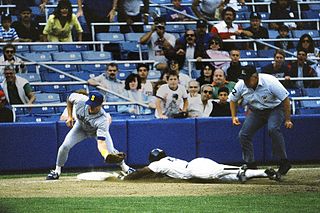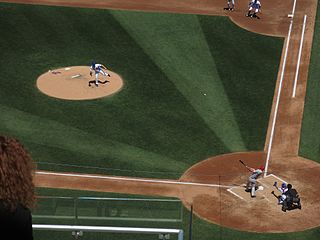Baseball statistics refers to a variety of metrics used to evaluate player and team performance in the game of baseball.

In baseball statistics, a hit, also called a base hit, is credited to a batter when the batter safely reaches or passes first base after hitting the ball into fair territory with neither the benefit of an error nor a fielder's choice.

In baseball statistics, on-base percentage (OBP) measures how frequently a batter reaches base. An official Major League Baseball (MLB) statistic since 1984, it is sometimes referred to as on-base average (OBA), as it is rarely presented as a true percentage.

In baseball, a stolen base occurs when a runner advances to a base unaided by other actions and the official scorer rules that the advance should be credited to the action of the runner. The umpires determine whether the runner is safe or out at the next base, but the official scorer rules on the question of credit or blame for the advance under Rule 10 of the MLB's Official Rules.

Baseball is a bat-and-ball sport played between two teams of nine players each, taking turns batting and fielding. The game occurs over the course of several plays, with each play generally beginning when a player on the fielding team, called the pitcher, throws a ball that a player on the batting team, called the batter, tries to hit with a bat. The objective of the offensive team is to hit the ball into the field of play, away from the other team's players, allowing its players to run the bases, having them advance counter-clockwise around four bases to score what are called "runs". The objective of the defensive team is to prevent batters from becoming runners, and to prevent runners' advance around the bases. A run is scored when a runner legally advances around the bases in order and touches home plate.

In baseball, a home run is scored when the ball is hit in such a way that the batter is able to circle the bases and reach home plate safely in one play without any errors being committed by the defensive team. A home run is usually achieved by hitting the ball over the outfield fence between the foul poles without the ball touching the field.

In baseball, a triple is the act of a batter safely reaching third base after hitting the ball, with neither the benefit of a fielder's misplay nor another runner being put out on a fielder's choice. A triple is sometimes called a "three-bagger" or "three-base hit". For statistical and scorekeeping purposes it is denoted by 3B.

In baseball and softball statistics, an error is an act, in the judgment of the official scorer, of a fielder misplaying a ball in a manner that allows a batter or baserunner to advance one or more bases or allows a plate appearance to continue after the batter should have been put out. The term error is sometimes used to refer to the play during which an error was committed.

José Dennis Martínez Ortiz, nicknamed "El Presidente", is a Nicaraguan former professional baseball pitcher. Martínez played in Major League Baseball (MLB) for the Baltimore Orioles, Montreal Expos, Cleveland Indians, Seattle Mariners, and Atlanta Braves from 1976 to 1998. He threw a perfect game in 1991, and was a four-time MLB All-Star. He was the first Nicaraguan to play in the majors.
In baseball, an extra-base hit, also known as a long hit, is any base hit on which the batter is able to advance past first base without the benefit of a fielder either committing an error or opting to make a throw to retire another base runner. Extra-base hits are often not listed separately in tables of baseball statistics, but are easily determined by calculating the sum total of a batter's doubles, triples, and home runs. Extra-base hits are particularly valuable because they ensure that there will be no runners on base that will be forced to advance on the next fair ball.

William D. Shindle was an American third baseman in Major League Baseball. He played from 1886 to 1898 for the Detroit Wolverines (1886–87), Baltimore Orioles, Philadelphia Athletics (1890), Philadelphia Phillies (1891), and Brooklyn Grooms/Bridegrooms (1894–98). Shindle was born in Gloucester City, New Jersey. He batted and threw right-handed, and he was slightly built at 5 ft 8 in (1.73 m) and 155 pounds.

On June 17, 1880, John Montgomery Ward of the Providence Grays threw a perfect game against the Buffalo Bisons at Messer Street Grounds. It was the second perfect game in Major League Baseball history, which at the time only consisted of the National League (NL). Ward's perfect game occurred just five days after Lee Richmond's perfect game.










